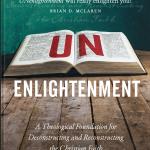As a philosopher, specifically metaphysics, I have been trained to view reality in terms of possibilities instead of certainty. I recognize this bias going into any thinking project. However, I also think this is a good way to view the world. This of course means that I am often cautious of any claims of certainty, even scientific claims but it also means it is difficult to land in any one place. For a secular philosopher, this might be okay, but for a religious thinker, it is a difficult perspective to overcome.
To make the claim that God exists violates the aforementioned rules of thinking. Even lessening the certainty of the claim by stating that I believe God exists does little to ease my relativistic thinking. At some point in my philosophical journey, I realized that even if I exist in the realm of possibility, I still have to come to the understanding that one of those realms must be the real world. In fact, I do know with certainty, which of those worlds is real because I exist in it. My mere existence makes it certain. And, as any good existentialist would argue that is what matters.
This means it is at least the case that some certainty is warranted given the right circumstances. That does not mean we have to become materialists, but we can at least send a nice head nod in their direction even if they gaze at us with haughty derision.
Is Faith Certain?
When it comes to my faith, I do think that we have to believe in some things with certainty. For example, If I call myself a Christian, I should believe at least two things with some level of certainty. 1. God exists. 2. Jesus Christ was who he said he was. I think everything else is up for grabs.
Many of us have been taught that faith is antithetical to certainty. That faith is something you have because you are uncertain. But this is untrue (pun intended). Instead, faith is what we have as part of our journey into something more certain.
With that said it is important to understand what we mean by certainty. Certainty is not a thing that one obtains. Certainty is not a thing where one day you are without it and the next day you have it. There are degrees of certainty. For example, I am more certain of the existence of dinosaurs than I am of aliens. I am even more certain of my own existence than that of dinosaurs.
In philosophy, this is understood as probabilistic thinking. That is, we give weight to all truth claims and how true they might be and then make our decisions based on that weight. For example, should I jump out of this window and risk dying or should I stay and probably die at the hands of the uncompromising Chuck Norris? I calculate the risk based on the probability of surviving the fall versus surviving Norris. Yes, Norris is old, but he is still a bad dude. So, I take the calculated risk and jump.
There is also a distinction to be made between the extent to which I believe something to be certain – say God’s existence; and the extent to which I display that certainty to others. For example, in my personal life, my certainty regarding God always ebbs and flows – especially given my mood and experiences. However, in a situation where someone questions my belief in God, I will without hesitation assert my certainty.
Which version of certainty is more real is up for debate. Does my inner life allow me the freedom to experiment with curiosity and flip flopping on important issues? Absolutely, because I am my only judge. But when I put something out there in the world, I cannot take it back. People are free to judge it, analyze it, comment on it, etc. In some respect it has existence. For that reason alone, it might be more indicative of what I actually believe than what I experiment with in my inner thoughts because I know it is how the world perceives me to be.
Then of course we ask is the world’s perception of me the real me? Do I even have the ability to know myself apart from others’ perceptions of me? These are fun, but tangential questions for another time.
Does God Exist?
I am to some level certain of God’s existence – apart from actually seeing him I don’t think I can be fully certain. But I am certain to the extent that I would welcome death for this belief. I think he probably does, but that is based on many years of evidence, rationales, and experiences.
Unlike most progressive thinkers I do give weight to the classical arguments for God’s existence. Many might argue that these sorts of arguments are philosophical chicanery. Perhaps this is true. But I think it is only true when taking them individually. To me, the arguments for God’s existence are all “arguments of aspect”. What I mean by that is individually each argument is insufficient in “proving” in some logical sense the existence of God. Instead, each argument “proves” an aspect of God from a particular perspective. It is only when put together that they create a logical holistic picture of God.
For example, I think Anselm’s ontological argument is a strong argument for the existence of God (a nuanced version of it), but only from an existential logical perspective. It does not prove to me that God is moral; that Jesus was the Son of God; or even that I am following the right God. It only demonstrates the necessity for a God (any god) to exist (and to exist in a certain way).
However, when I take the nuanced ontological argument (Anselm) and pair it with the cosmological argument (Aquinas) and the argument of sufficient reason (Leibniz) I have a level of certainty that is pretty high. In my opinion, these three arguments together are very difficult if not impossible to overcome.
With that said, these arguments are only sufficient for belief in the actuality of God. They say nothing about following God. So, what is it that convinces me to follow God versus just acknowledging God’s existence? For me, the Christological argument, the Pauline argument, and Pascal’s wager argument are so convincing that if someone believes God does exist, they would be a fool not to also follow that God.
More than likely you are unfamiliar with the Christological and Pauline arguments as sufficient reason for belief in God because they are a variety of cobbled arguments that I have created over the years. If you have read my book, UNenlightenment then you should be familiar with them. However, in my next article, I will explain these two perspectives in detail as well as my understanding of Pascal’s wager which is probably different from what you are used to hearing. That should round off our exploration into certainty and God’s existence.
You can view my UNenlightenment YouTube Channel HERE
You can view my UNenlightenment Podcast HERE
You can follow me on FaceBook HERE
You can purchase the book UNenlightenment HERE.















